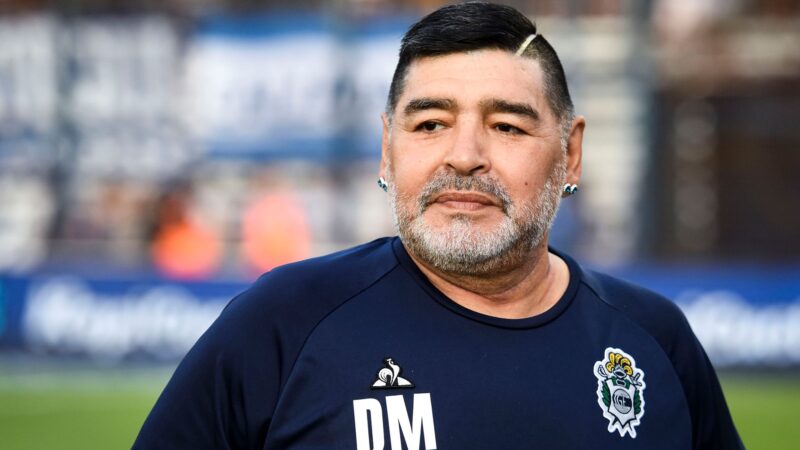

Diego Maradona
Seven health professionals face manslaughter probe over Maradona’s death
Seven people have been placed under formal investigation for manslaughter in Argentina over the November death of footballing legend Diego Maradona.
The accused – who include Maradona’s neurosurgeon Leopoldo Luque, psychiatrist Agustina Cosachov and psychologist Carlos Diaz – potentially face eight to 25 years in prison.
The indictment is based on findings by a board of experts into Maradona’s death from a heart attack last year, a source from the San Isidro Attorney General’s Office, which is leading the investigation, said Wednesday.
That report concluded that the footballing icon received inadequate medical care and was left to his fate for a ‘prolonged, agonizing period’ before his death, which came just weeks after undergoing brain surgery on a blood clot.
‘After so many injustices, the case has come full circle,’ the source told AFP.
The accused are prohibited from leaving the country and must appear ahead of an inquiry between May 31 and June 14.
The legal proceedings were prompted by a complaint filed by two of Maradona’s five daughters against Luque, who they blamed for their father’s deteriorating condition after the brain surgery.
Prosecutors believe Maradona’s death was not the result of malpractice or negligent actions of his doctors, but that they knew the former soccer star would die and did nothing to prevent it.
The prosecutors obtained a series of messages and audio that show that the medical team were aware that Maradona was using alcohol, psychiatric medication and marijuana in the last months of his life.
Among the conclusions of the report, the medical board said that ‘the signs of life risk’ shown by the former Napoli and Barcelona star were ignored, and that his care in his final weeks was ‘plagued by deficiencies and irregularities’.
The recriminations and accusations over Maradona’s death are taking place alongside another case, over his disputed inheritance, involving his five children, his brothers and Matias Morla, his former lawyer.
Maradona is an idol to millions of Argentines after he inspired the South American country to only their second World Cup triumph in 1986.
Maradona began taking cocaine in the mid-1980s – during the height of his playing days, going on to develop an addiction to drugs and alcohol over the next two decades.
His drug use began in 1982 and reportedly grew worse in 1984 when he moved to Napoli and had connections with the Comorra.
In 2014, Maradona said of his drug use: ‘I gave my opponents a big advantage. Do you know the player I could have been if I hadn’t taken drugs?’
His first real punishment came in 1991 when he was banned for 15 months by Napoli after testing positive for cocaine. Later in the same year he was arrested in Buenos Aires for possessing half a kilo of cocaine, and was given a 14-month suspended sentence.
In 1994, Maradona was back in the fold with the Argentina national team, making headlines around the world for a now-famous screaming celebration into the camera lens after a goal against Greece. His tournament was to come to an early end, though, after he was expelled days later for testing positive for five variants of ephedrine, a banned substance. He was banned for 15 months, ending his international career.
In 1995, he moved to Boca Juniors but two years later he failed a drugs test for the third time in six years, putting an end to his playing career. Officially, a ‘prohibited substance’ is all that has been revealed about that test, but Boca president Mauricio Macri has said in interviews that cocaine was found in a urine sample.
In 1996, Maradona said publicly: ‘I was, am and always will be a drug addict.’
In 2000, the footballing legend suffered an overdose, and in 2004 he had a heart attack. A year later, he was forced to have gastric bypass surgery, and in 2007 he was back in hospital again, this time suffering hepatitis.
It is then understood he stopped taking drugs, telling a journalist in 2017 that he hadn’t taken drugs for 13 years and was feeling ‘great’.
He has been drinking alcohol since 2004, though, hitting the headlines at the 2018 World Cup for his bizarre antics at a number of Argentina games. A video emerged of him drinking tequila on a plane, and he claimed he ‘drank all the wine’ ahead of their win over Nigeria.
‘We’re not hiring,’ NNPC denies viral recruitment adverts The Nigerian National Petroleum Company, (NNPC) Limited…
Communal Clash: Gov Adeleke imposes new curfew on Ifon, Ilobu communities In response to the resurgence…
BREAKING: IGP redeploys 38 police commissioners The Inspector-General of Police (IGP), Kayode Adeolu Inspector-General of Police…
Osimhen breaks Odegbami’s Eagles goal record Nigerian striker Victor Osimhen has eclipsed legendary striker Segun…
2026 WCQ: Super Eagles move up to third place with 2-0 win in Rwanda Nigeria…
NADDC DG hails Kojo Motors for establishing CNG conversion centre in Owerri Kojo Motors has…